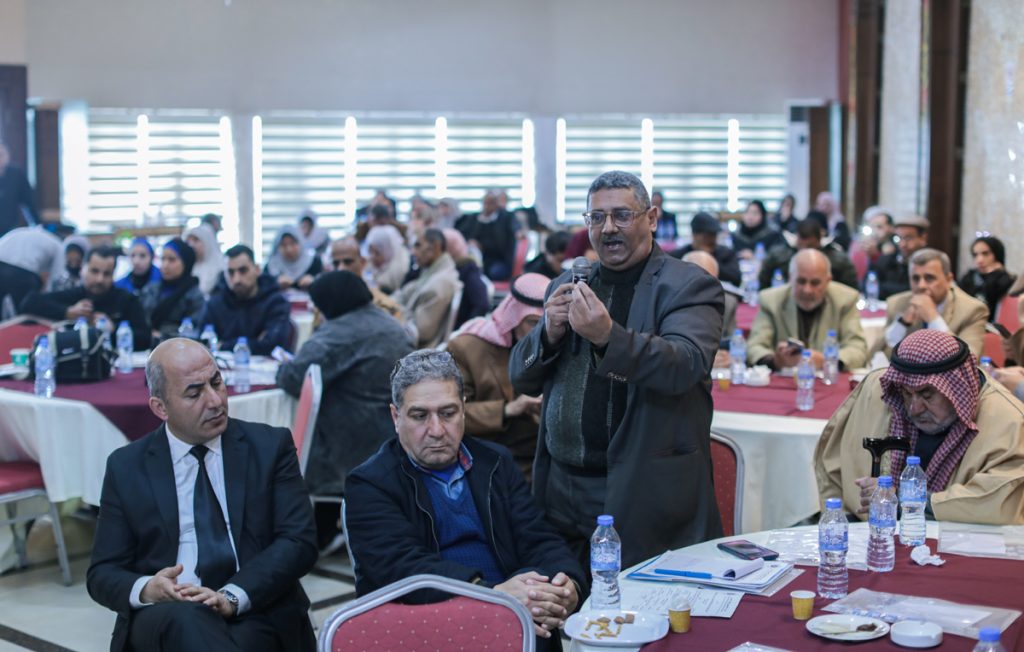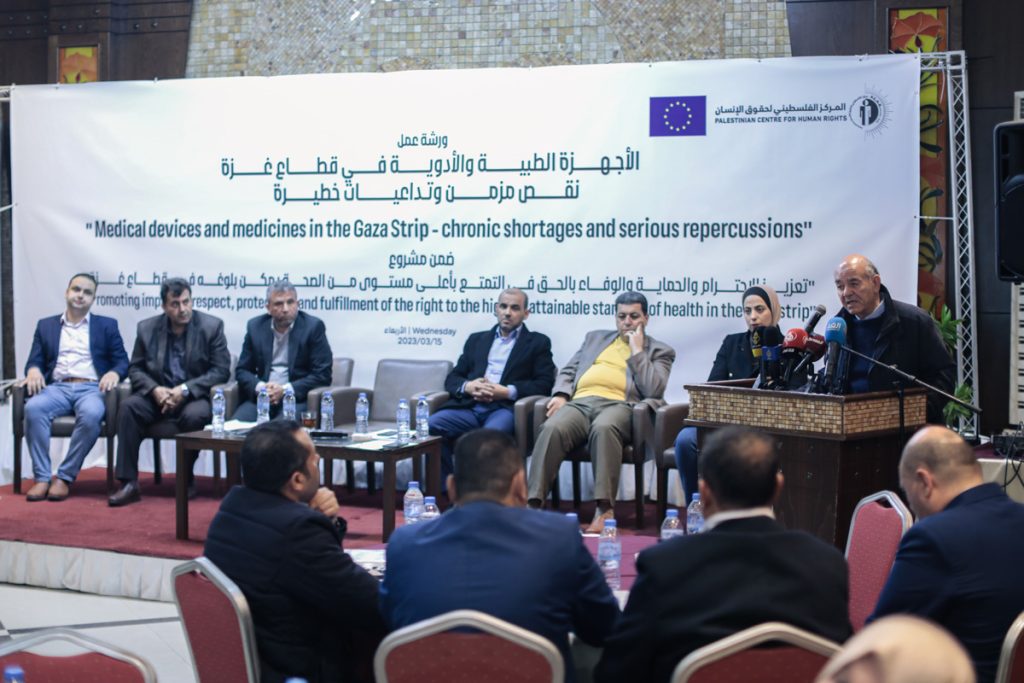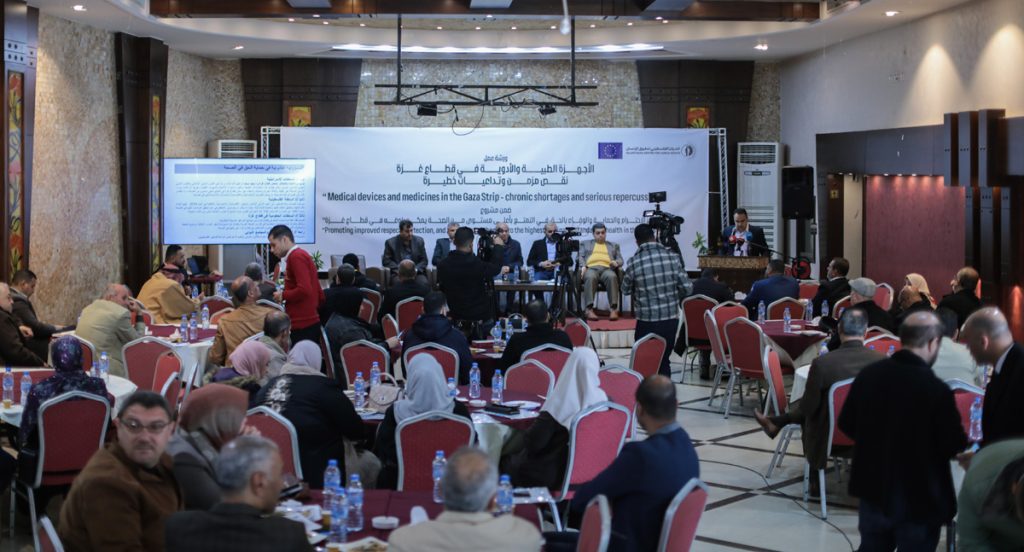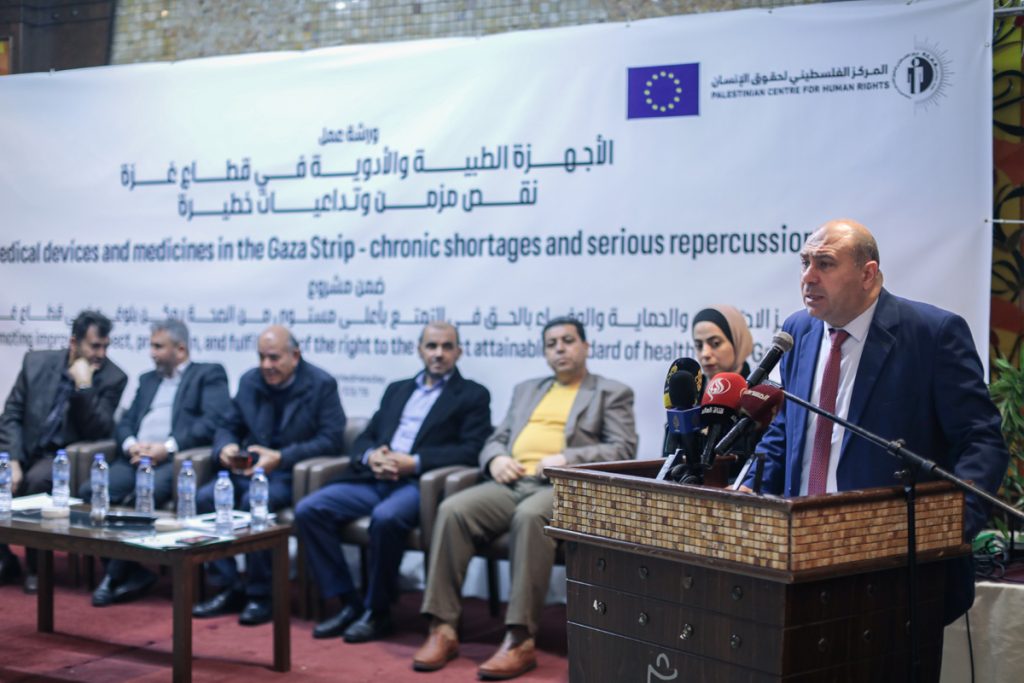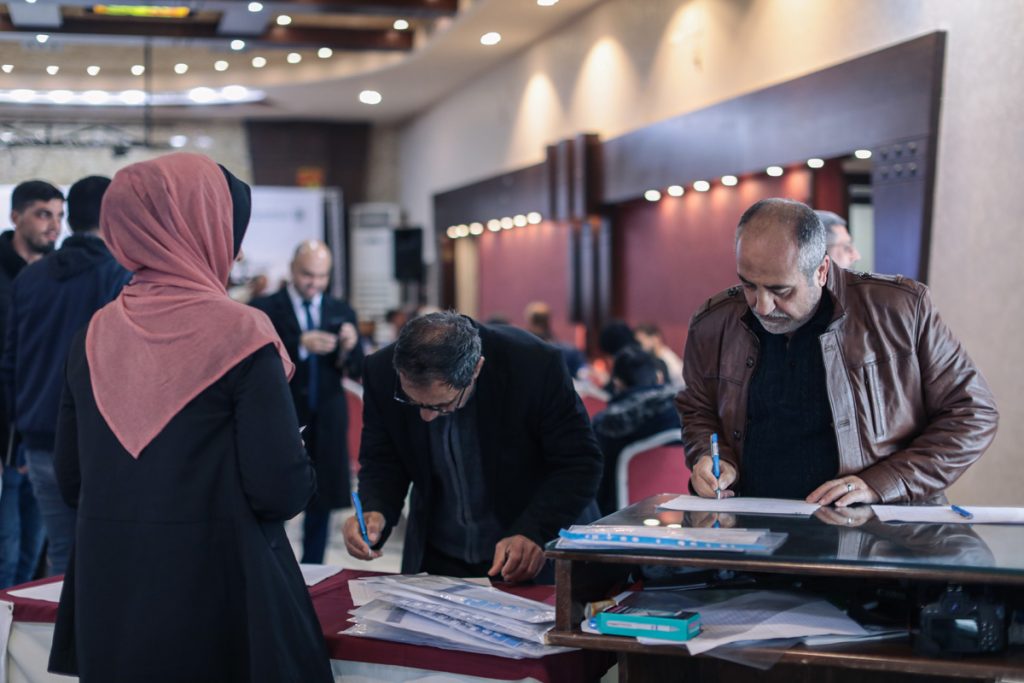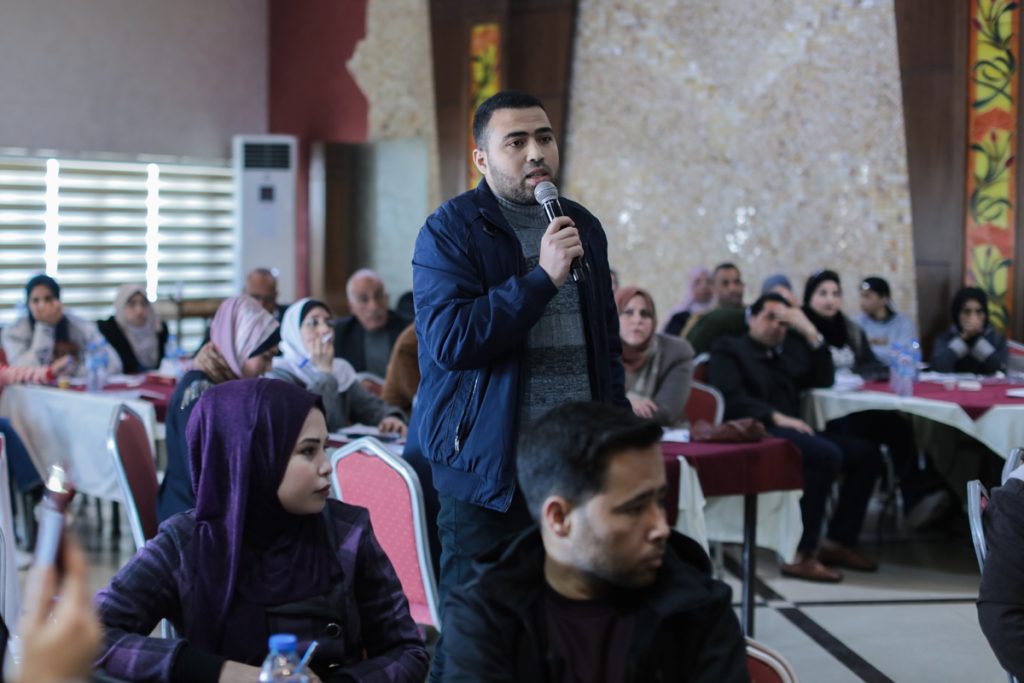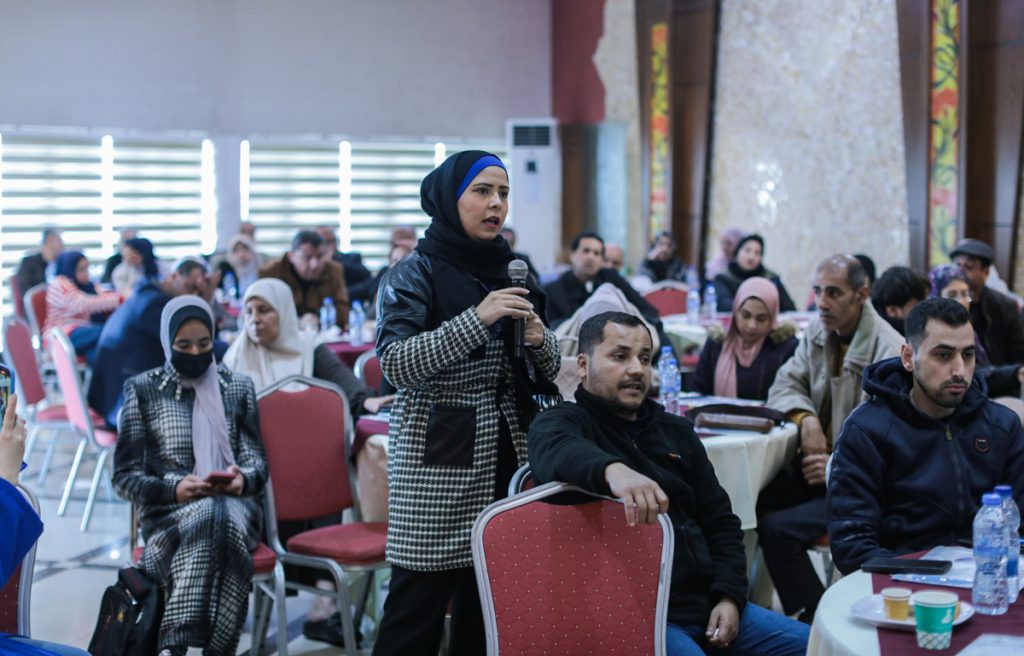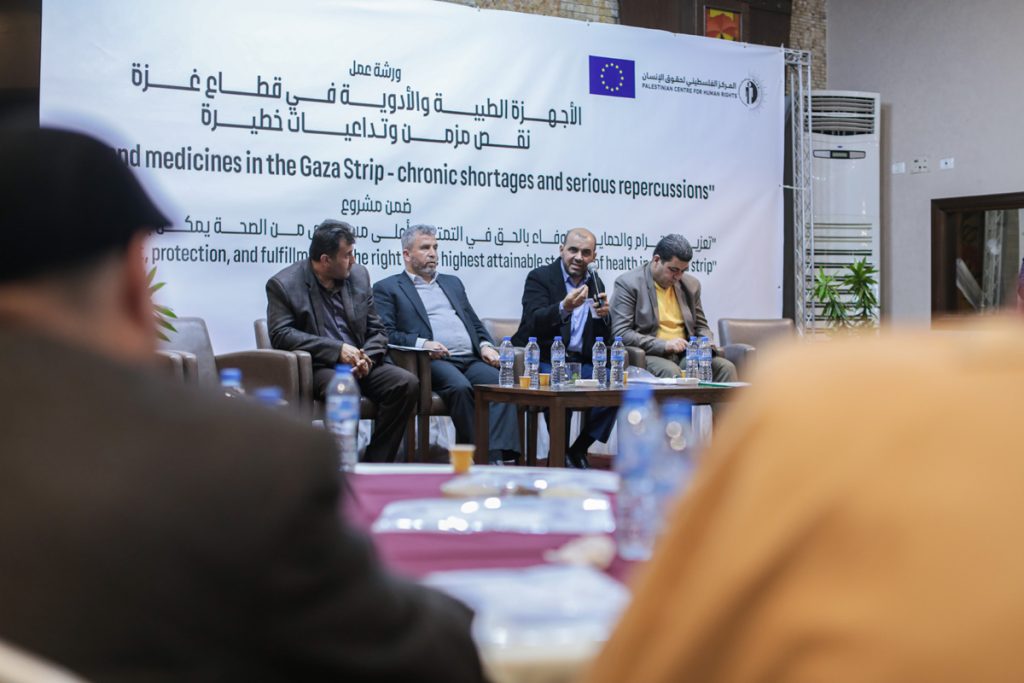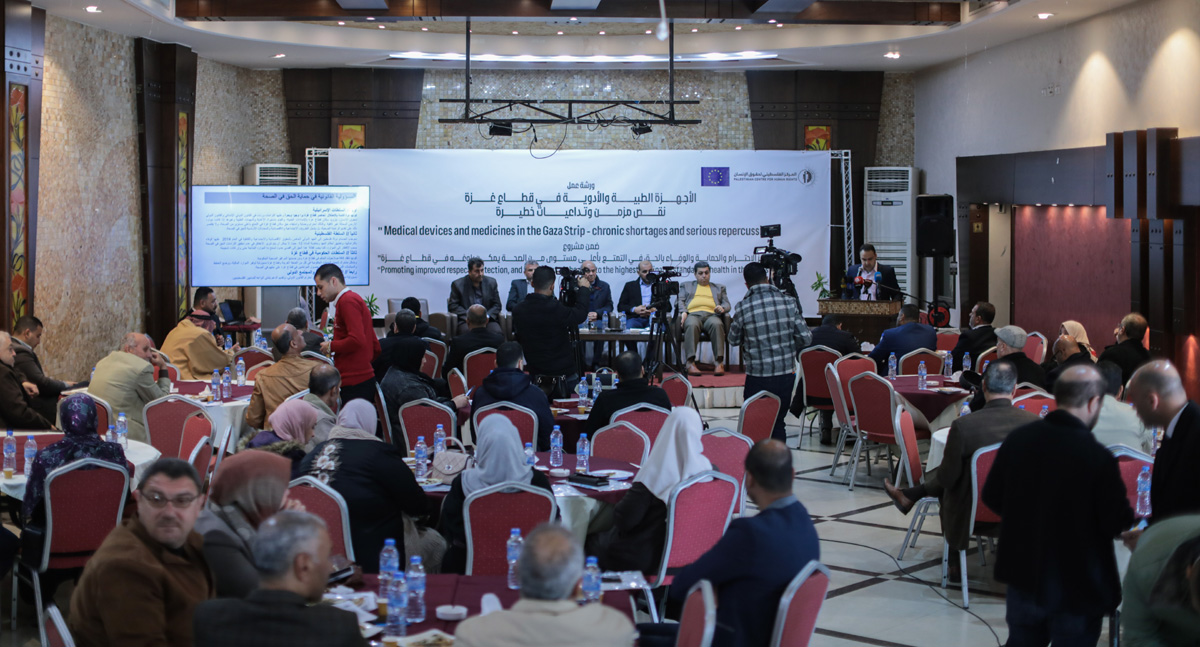
Ref: 21/2023
Date: 16 March 2023
On Wednesday, 15 March 2023, the Palestinian Centre for Human Rights (PCHR) organized a workshop titled as “Medical Equipment and Medicines in the Gaza Strip: Perpetual Shortage and Serious Repercussions”. The Workshop was attended by the representatives from the Ministry of Health (MOH), World Health Organization (WHO), non-governmental health sector, Civil Society Organizations (CSOs), and a number of patients.
Mr. Raji Sourani, Director of PCHR, opened the workshop talking about the Israeli Occupation Forces’ (IOF) unjustified ban on the entry of medicines and medical equipment, and restriction on patients’, describing these practices as a stigma and a crime that shall never go unpunished. Sourani demanded necessary protection for the Gaza patients’ right to health as they have been suffering for years. He emphasized that IOF still ban the travel of hundreds of Palestinian patients while only allowing the travel of cases classified as “lifesaving”. Sourani added that banning the entry of medical equipment under the pretext of “dual use” is unacceptable and called on the international community to immediately intervene and end the unjust Israeli-imposed closure on the Gaza Strip, denouncing the double standards of the international community when dealing with the rights of the Palestinian people.
Ayman Lubbad, a researcher at PCHR’s Economic and Social Rights Unit, presented PCHR’s report “Medical Equipment and Medicines in Gaza Strip: Perpetual Shortage and Serious Repercussions”. Lubbad emphasized that lack of medical supplies, including drugs and consumables, and the obsolescence and acute shortage of medical equipment have undermined the healthcare system in the Gaza Strip. Lubbad pointed out that this is mainly due to the ongoing Israeli and closure and restrictions which limit the availability of healthcare services despite the occupation’s responsibility for guaranteeing the right to health for those under its control according to international humanitarian law. Lubbad said that the Palestinian political division has hindered the development of a concerted and national healthcare system and led to the absence of plans to enhance it, including localizing the health services, and increasing the operating expenses, as well as adopting a drug policy that guarantees the availability of treatment for all Palestinians, and providing all medical equipment in governmental healthcare facilities.
In his intervention, Dr. Ashraf Abu Muhadi, Director of MOH’s General Administration of Pharmacy, said that Gaza Strip relies on three main sources: funds from the Ministry of Finance to purchase drugs, funds from the MOH in Ramallah, and donations from the donors. Abu Muhadi said that these sources combined only cover 60% of the Gaza’s needs of medicines as Gaza needs drugs costing 45 million dollars annually (i.e., 123,000 dollars per day). Dr. Abu Muhadi emphasized donors reluctance to provide the necessary pharmacological support to the Gaza Strip, as the international pharmacological support decreased during the past year at a value of 10 million dollars, explicitly affecting the MOH healthcare services and considering that every drug item is a medical service, and the unavailability of any of it leads to a major shortcoming of the treatment of serious diseases as well as the suspension of vital services in surgeries, intensive care, emergency and other departments.
Eng. Mazen Al-‘Araishi, Director General of Maintenance Department at the Ministry of Health, presented an intervention reviewing the chronic shortage in medical equipment, confirming what was introduced by PCHR’s report. Al-‘Araishi added that this year witnessed the breakdown of a new magnetic resonance imaging (MRI) machine serving the southern Gaza Strip governorates. Al-‘Araishi emphasized that the Gaza Strip is in very much need of medical devices which requires financial resources that cannot be afforded by the MOH in Gaza, adding that many international donors support MOH with some medical equipment but the Israeli-imposed restrictions obstruct and ban their entry unjustifiably under the pretext of “dual-use items”. Al-‘Araishi demanded the international organizations, including WHO, intervene before a disaster occurs due to the shutdown of one of the most important oxygen generator stations at Al-Shifa Medical Complex due to banning the entry of spare parts for six months.
Dr. Raafat Al-Majdalawi, Director of Al-‘Awda Health and Community Association, stressed that IOF’s intends to undermine the governmental and non-governmental healthcare system. Al-Majdalawi indicated that the Israeli occupation deliberately imposes restrictions on the supply of medical equipment despite knowing that it would exacerbate the suffering of thousands of patients. Al-Majdalawi added that the Palestinian healthcare system suffers from frequent crises and has been dramatically marginalized, calling for concerted efforts to promote the healthcare sector and provide proper health services for the citizens.
For her part, Dr. Saja Fteiha, Project Coordinator at the Palestinian Medical Relief Society (PMRS), talked about the suffering of thalassemia patients in the Gaza Strip, saying that about 304 thalassemia patients suffer from shortage of drugs and vitamins, which they constantly need. Fteiha underlined a significant decline in blood transfusion services and laboratory tests, causing health problems for this category of patients. She concluded that in 2022 8 patients died due to hemochromatosis (a disorder in which the body can build up too much iron.
Eng. Hani Radwan, representative of Sandouqa Company for Medical Supplies, also reviewed the suffering of private companies regarding the supply of medical equipment due to the Israeli Occupation’s bureaucratic procedures on obtaining a prior coordination to allow the entry or exit of machines for maintenance. Radwan added that IOF reject requests to allow the entry of equipment for various reasons, forcing companies to submit requests once again after 2 months, incurring large financial losses to the supplying companies.
At the end of the workshop, the attendees recommended to endeavor all efforts by the MOH administrations in Ramallah and Gaza in order to provide all types of medicines and basic medical supplies, to increase financial allocations designated for the healthcare sectors to purchase drugs and all medical equipment and machines necessary for the localization of healthcare services at the Gaza Strip’s hospitals. The attendees also demanded more advocacy campaigns to be held in order to draw the attention of the international community to compel the Israeli authorities to allow the entry of all medical needs and end restrictions on the travel of patients for treatment outside the Gaza Strip.
